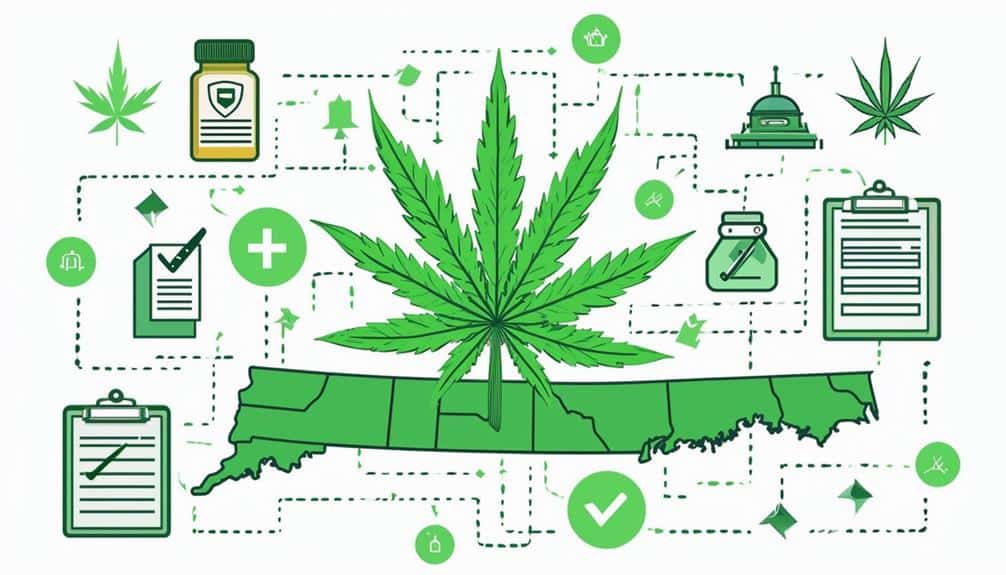Delaware’s recent expansion of medical marijuana regulations has broadened the list of qualifying conditions, making it more accessible for new patients. Understanding these changes is crucial for comprehending the state’s legal landscape, particularly if you’re a patient, caregiver, or involved with a dispensary. The new rules extend beyond eligibility to cover the application process, prescription limits, and dispensary guidelines. Compliance is key and there are specific responsibilities you need to be aware of. Let’s delve into how these updates impact you and what steps are necessary to ensure your compliance with the law.
Table of Contents
Legislative Background

The journey towards Delaware’s new medical marijuana regulations has been complex. However, understanding the legislative background is vital to grasp the current legal framework.
Delaware’s history with medical marijuana legislation began in 2011 with the passage of the Delaware Medical Marijuana Act. This act permitted patients with qualifying medical conditions to use marijuana for therapeutic purposes under strict regulations.
Over time, amendments and revisions have been made to address evolving medical needs and societal attitudes. For instance, in 2015, the state expanded its list of qualifying conditions and streamlined the application process for patients and caregivers. These changes were driven by increasing evidence of marijuana’s medical benefits and growing public demand for broader access.
The impact of these legislative changes has been significant; they’ve not only provided relief to countless patients but also established a regulated system that ensures product safety and quality.
Eligibility Criteria
To qualify for medical marijuana in Delaware, patients must meet specific eligibility criteria established by the state’s regulations. You need to demonstrate that you have one of the qualifying medical conditions, such as chronic pain, cancer, or PTSD among others. The state has a detailed list of these conditions to ensure only those with genuine medical needs gain access.
Patient qualifications require thorough documentation, including a detailed medical history. You’ll need to provide medical records that substantiate your condition and its impact on your daily life. This documentation is crucial for proving that traditional treatments haven’t been effective for you.
A key component of the eligibility process is obtaining a physician certification. Your doctor must be licensed in Delaware and have a bona fide relationship with you. They’ll review your medical history and assess whether medical marijuana could be beneficial for your condition. The physician certification acts as a formal recommendation, adding credibility to your application.
Application Process

Navigating the application process for medical marijuana in Delaware requires careful attention to detail and specific documentation.
Firstly, gather all required documents which typically include a valid Delaware ID, proof of residency, and a completed Physician Certification Form. Ensure your doctor is registered with the Delaware Medical Marijuana Program as this certification is essential.
Next, consider the application timeline. Submit your application online or by mail but bear in mind that the review process can take up to 45 days. It’s crucial to submit all required documents promptly to avoid delays. The application fees are $50, payable at the time of submission. This fee is non-refundable, so double-check your paperwork for accuracy before sending it off.
Once your application is submitted, the approval process begins. This involves verifying your documents and ensuring you meet all eligibility criteria. If everything checks out, you’ll receive your medical marijuana card, granting you legal access to dispensaries in Delaware.
Approved Medical Conditions
According to Delaware’s new medical marijuana regulations, a range of specific medical conditions qualify for treatment with medical cannabis. These include chronic pain, cancer, HIV/AIDS, multiple sclerosis and epilepsy among others. The state’s guidelines focus on conditions where traditional treatments may not offer sufficient relief or where medical marijuana has shown potential treatment effectiveness.
It’s important to understand that while medical cannabis provides relief for many people, research gaps still exist necessitating ongoing studies to fully understand its benefits and limitations.
Patient access is a significant consideration; Delaware aims to ensure those who need medical marijuana can obtain it without undue barriers. However, affordability concerns persist as the cost of medical cannabis can be prohibitive for some patients. Addressing these issues is vital for making medical marijuana a viable treatment option for all qualified patients.
Dispensary Guidelines

To comply with Delaware’s new medical marijuana regulations, dispensaries must adhere to strict operational guidelines that cover everything from security measures to product quality standards.
Your dispensary operations should be efficient and secure, offering a wide variety of products to meet diverse patient needs. Key areas of focus include patient consultations and dosage recommendations to promote safe and effective use.
To help you navigate these regulations, here are some critical guidelines:
- Security Measures: Implement robust security systems, including surveillance cameras and restricted access areas, to protect both patients and products.
- Product Quality: Regularly test your products for purity and potency to maintain high standards, promoting patient safety and efficacy.
- Staff Training: Provide comprehensive training for staff on regulatory compliance, patient care, and product knowledge to enhance service quality.
- Patient Consultations: Offer personalized consultations to help patients understand their options and make informed decisions about their treatment.
- Dosage Recommendations: Develop clear guidelines for dosage recommendations based on individual patient needs, promoting effective therapeutic outcomes.
Prescription Limits
The new medical marijuana regulations in Delaware impose strict prescription limits to ensure responsible usage and prevent abuse. The state has implemented detailed dosage restrictions so that patients receive only the amount necessary for their medical conditions. These restrictions are designed to minimize the risk of overconsumption and potential dependency. Physicians play a crucial role in this process as they must provide explicit approval for each patient’s prescribed dosage.
Prior to issuing a prescription, the physician must thoroughly evaluate the patient’s medical history and current health status. This evaluation ensures that the dosage is tailored to the individual’s specific needs promoting both safety and efficacy. The new regulations require physicians carefully document their approval, outlining their rationale for the prescribed amount. This step adds an extra layer of accountability and transparency.
Moreover, the regulations mandate periodic reviews of the patient’s condition and the effectiveness of the prescribed dosage. Physicians must adjust the dosage as necessary based on these evaluations. This continuous monitoring helps to maintain a balance between therapeutic benefits and potential risks, ensuring that patient health and well-being remain top priorities.
Patient Rights

Patients exploring Delaware’s new medical marijuana regulations will find that their rights are explicitly defined to protect their access and ensure fair treatment. These regulations aim to ensure you’re fully informed about your privacy concerns, access rights, and legal protections.
To help you understand your rights, here’s a breakdown:
- Access Rights: You have the right to obtain medical marijuana from licensed dispensaries without unnecessary barriers.
- Privacy Concerns: Your medical information related to marijuana use is protected under state law ensuring confidentiality.
- Legal Protections: You’re safeguarded from prosecution under state law for possessing and using medical marijuana as prescribed.
- Employment Rights: You can’t be discriminated against by employers solely based on your status as a medical marijuana patient.
- Usage Boundaries: While you have the right to use medical marijuana, it’s vital to adhere to prescribed usage limits to avoid legal complications.
These rights are designed to provide a balanced framework where you can access necessary treatment without fear of legal repercussions or employment discrimination.
Delaware’s regulations emphasize your right to privacy and work towards creating an environment of trust and fairness. By knowing and understanding these rights, you’re better equipped to navigate the legal landscape of medical marijuana in Delaware.
Caregiver Responsibilities
In addition to patient rights, caregivers in Delaware must adhere to specific responsibilities under the new medical marijuana regulations. As a caregiver, you play a crucial role in ensuring patient support by managing medical marijuana use in compliance with state laws. Your legal obligations include registering with the Delaware Department of Health and Social Services and undergoing a background check. This ensures your eligibility to provide the necessary care.
You’re responsible for acquiring medical marijuana from authorized dispensaries and administering it according to the patient’s needs. Ensuring accurate dosage and proper usage is key for effective patient support. Additionally, maintaining up-to-date records of all transactions and usage is mandatory. This not only aids in monitoring the patient’s condition but also ensures transparency and accountability.
Transporting medical marijuana securely and storing it safely at home are also part of your responsibilities. You must ensure that only authorized individuals have access to the substance.
Lastly, staying informed about any changes in regulations is crucial for remaining compliant. By fulfilling these responsibilities, you significantly contribute to the well-being of patients under your care.
Compliance and Enforcement

Ensuring compliance with Delaware’s medical marijuana regulations involves a multifaceted approach that includes regular inspections, stringent documentation, and strict oversight by state authorities. As an entity involved in this sector, you must remain vigilant to meet these standards and avoid potential penalties.
Here’s what you need to focus on:
- Regular Inspections: State authorities conduct surprise visits to confirm facilities adhere to safety and quality standards. Be prepared for these visits by maintaining a clean and orderly environment.
- Stringent Documentation: Accurate and current records of all transactions, inventory, and patient interactions are crucial. This documentation helps validate compliance and traceability.
- Employee Training: Adequate training ensures that staff understand and adhere to the regulations. This can reduce risks and improve overall operational efficiency.
- Community Engagement: Interacting with the community and addressing their concerns can cultivate goodwill ensuring smoother operations.
- Legal Guidance: Regular consultations with legal experts help you stay informed about regulatory changes allowing for prompt implementation of necessary adjustments.
In Conclusion
You’ve navigated Delaware’s new medical marijuana regulations, securing compliance with exacting standards while safeguarding patient rights. Interestingly, the state that once prohibited marijuana now mandates routine inspections and employee training to sustain therapeutic benefits.
By understanding eligibility criteria, application processes, approved conditions; you’re prepared to benefit from this transformative legislation. Remember, while the journey might seem challenging it’s designed to ensure product safety and quality leading ultimately towards a healthier more knowledgeable patient community.
If you have any questions or need further guidance feel free to visit Cannabis Docs of Delaware or give us a call at (855) 420-6797. We’re here to help you every step of the way and ensure you have all the information you need. Looking forward to connecting with you!

